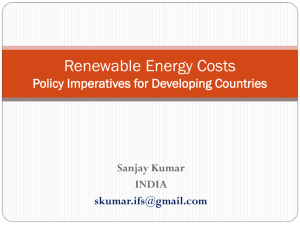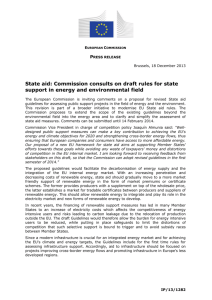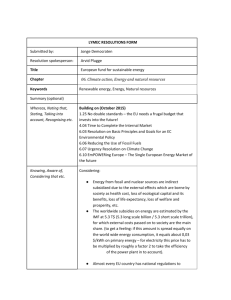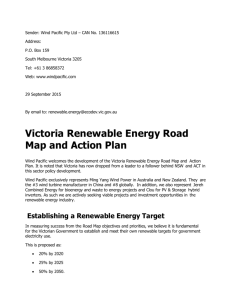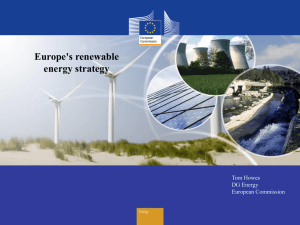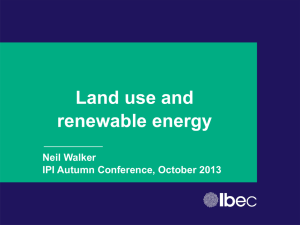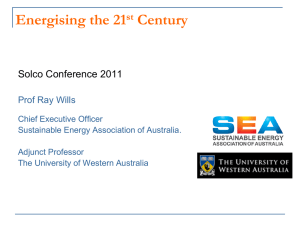Dear Member Please find below a briefing from Energy Action
advertisement
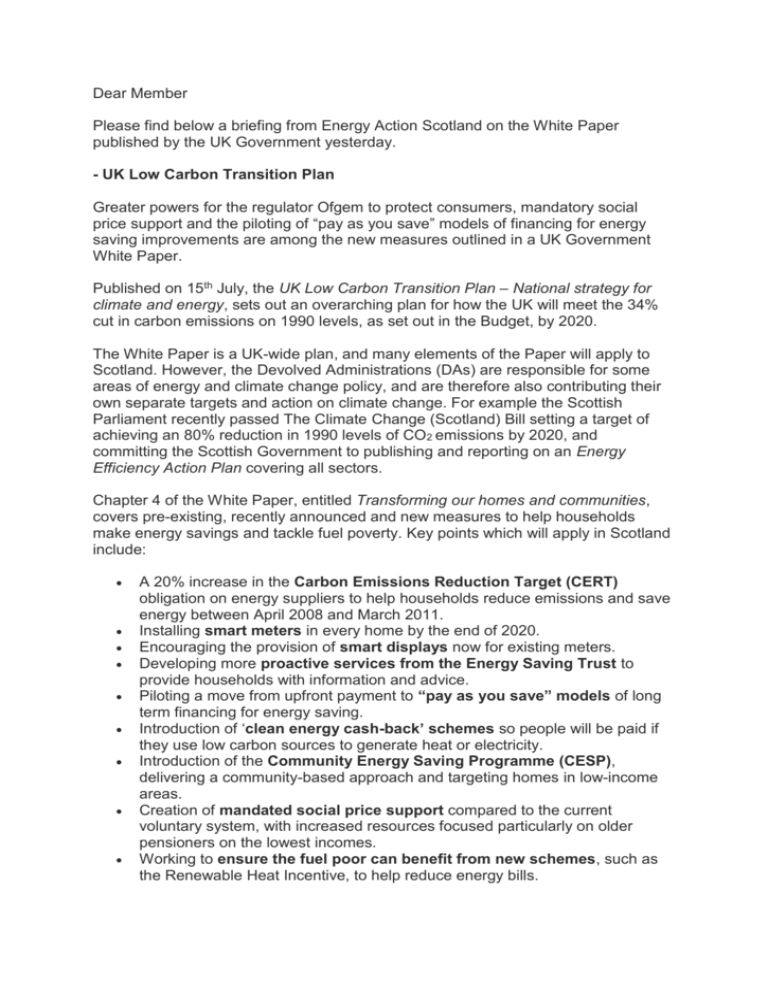
Dear Member Please find below a briefing from Energy Action Scotland on the White Paper published by the UK Government yesterday. - UK Low Carbon Transition Plan Greater powers for the regulator Ofgem to protect consumers, mandatory social price support and the piloting of “pay as you save” models of financing for energy saving improvements are among the new measures outlined in a UK Government White Paper. Published on 15th July, the UK Low Carbon Transition Plan – National strategy for climate and energy, sets out an overarching plan for how the UK will meet the 34% cut in carbon emissions on 1990 levels, as set out in the Budget, by 2020. The White Paper is a UK-wide plan, and many elements of the Paper will apply to Scotland. However, the Devolved Administrations (DAs) are responsible for some areas of energy and climate change policy, and are therefore also contributing their own separate targets and action on climate change. For example the Scottish Parliament recently passed The Climate Change (Scotland) Bill setting a target of achieving an 80% reduction in 1990 levels of CO2 emissions by 2020, and committing the Scottish Government to publishing and reporting on an Energy Efficiency Action Plan covering all sectors. Chapter 4 of the White Paper, entitled Transforming our homes and communities, covers pre-existing, recently announced and new measures to help households make energy savings and tackle fuel poverty. Key points which will apply in Scotland include: A 20% increase in the Carbon Emissions Reduction Target (CERT) obligation on energy suppliers to help households reduce emissions and save energy between April 2008 and March 2011. Installing smart meters in every home by the end of 2020. Encouraging the provision of smart displays now for existing meters. Developing more proactive services from the Energy Saving Trust to provide households with information and advice. Piloting a move from upfront payment to “pay as you save” models of long term financing for energy saving. Introduction of ‘clean energy cash-back’ schemes so people will be paid if they use low carbon sources to generate heat or electricity. Introduction of the Community Energy Saving Programme (CESP), delivering a community-based approach and targeting homes in low-income areas. Creation of mandated social price support compared to the current voluntary system, with increased resources focused particularly on older pensioners on the lowest incomes. Working to ensure the fuel poor can benefit from new schemes, such as the Renewable Heat Incentive, to help reduce energy bills. In the Analytical Annex to the White Paper, Chapter 5 examines the estimated impact of the package of polices and proposals on energy prices and bills. In total the package is expected to increase domestic energy bills by 9% (or £125) compared to the baseline in 2020.The breakdown of bills into gas and electricity components shows the biggest percentage increase will come from the rise in domestic gas bills. The additional impact in 2020 of the policies in the White Paper relative to today is an average of £76, or approximately 6% of current energy bills. - Renewable Energy Strategy Other related reports were published alongside the White Paper, including a Renewable Energy Strategy setting out how the UK will meet the European Commission’s Renewable Energy Directive and achieve the UK’s target of getting 15% of all energy (electricity, heat and transport) from renewable sources by 2020. The Renewable Energy Strategy is an integral part of the overall UK Low Carbon Transition Plan. The Renewable Energy Strategy will: Put in place mechanisms to provide financial support for renewable electricity and heat worth £30 billion between now and 2020 by, for example, expanding the Renewables Obligation and introducing ‘clean energy cash-back’ incentives. Drive delivery and clear away barriers – the Office for Renewable Energy Deployment (ORED), part of the Department of Energy and Climate Change, has been established to drive delivery of targets through stronger supply chains and the planning system. Increase investment in emerging technologies and pursue new sources of supply. Introduce new mechanisms to support investment by householders and communities in small-scale renewable heat and electricity generation. The UK Government has worked closely with the Devolved Administrations (DAs) in developing the Renewable Energy Strategy and, with each country setting policies within their own areas of responsibility, will continue to work closely with them in implementing it and developing a UK national action plan. Each of the DAs is setting out its own plan to increase renewable energy use and will be working together with the UK Government to ensure the plans are aligned. Each of the DAs has also agreed to undertake an evidence-gathering exercise to assess renewable electricity and heat potential and barriers, and propose a level of ambition for renewables deployment based on that assessment for renewable energy delivery by 2020. The Scottish Government has already published a Scottish Renewables Action Plan with the aim of supporting and accelerating the implementation of renewable energy in line with EU targets. A Renewable Heat Action Plan for Scotland, a mandatory provision of the recently passed Climate Change (Scotland) Bill, is expected to be published later this summer. The Scottish Government is continuing to engage with the UK Government on the shape and scope of renewable energy legislation. With Renewables Obligation (RO) banding now in place, Scottish and UK Ministers are working on the further changes to the RO required to align it with the demands of the EU 2020 renewable energy target, as well as on the emerging details of the Feed-In Tariffs for small-scale electricity and a Renewable Heat Incentive. Scottish Ministers will be consulting on these matters during the coming months. Download the UK Low Carbon Transition Plan and Annex, the UK Renewable Energy Strategy and all other related documents from the DECC website at: http://www.decc.gov.uk/en/content/cms/publications/lc_trans_plan/lc_trans_pl an.aspx#1 Bev Coombe Membership and Communications Manager
